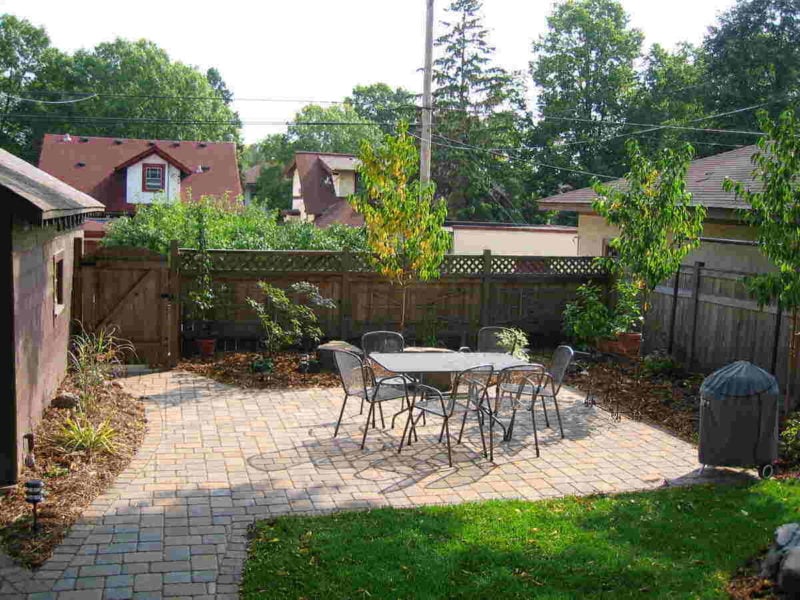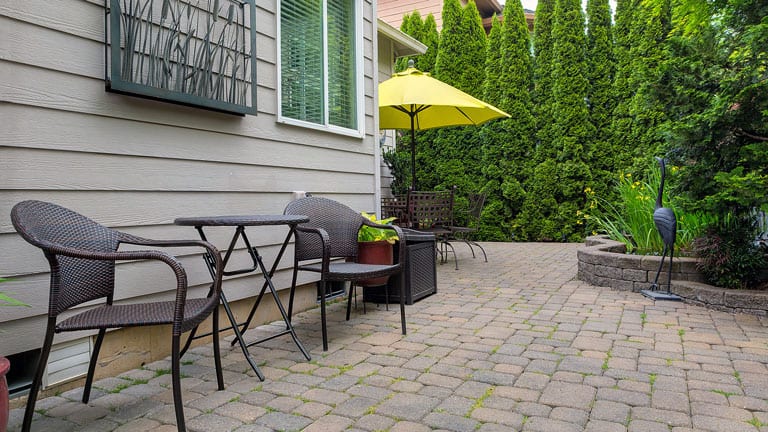The cost to paver a small patio typically ranges from $1,000 to $2,500. Prices vary depending on materials and labor.
Creating a small patio with pavers offers a functional and aesthetic upgrade to any outdoor space. Pavers come in various materials, including concrete, brick, and stone, allowing for customization to suit your style and budget. Costs will depend on the type of pavers chosen, the size of the patio, and labor expenses.
A well-planned patio can increase property value and provide a great space for relaxation and entertainment. Consider consulting with local contractors to get accurate quotes and ensure quality workmanship. Investing in a small paver patio can enhance your home’s outdoor appeal and usability.

Credit: www.lawnstarter.com
Factors Affecting Cost
Understanding the factors that impact the cost of paving a small patio is crucial. These factors include material choices, labor costs, and the size of the patio.
Material Choices
The materials you choose greatly influence the overall cost. Below are common materials and their typical price range per square foot:
| Material | Cost (Per Sq Ft) |
|---|---|
| Concrete | $6 – $10 |
| Brick | $8 – $12 |
| Natural Stone | $15 – $30 |
| Gravel | $2 – $5 |
Concrete is affordable and durable. Brick offers a classic look. Natural stone provides elegance but is pricier. Gravel is budget-friendly but less stable.
Labor Costs
Labor costs vary depending on complexity and region. Simple installations are cheaper. More intricate designs and patterns increase labor costs.
- Basic Installation: $8 – $15 per sq ft
- Complex Installation: $15 – $25 per sq ft
Labor costs also depend on the contractor’s expertise. Experienced contractors charge more but offer quality work.
In summary, material choices and labor costs are key factors that affect the cost of paving a small patio. Choose wisely to balance cost and quality.
Material Options
Choosing the right material for your small patio paver project is crucial. Each material has its own costs, benefits, and aesthetic appeal. Below, we explore three popular material options: concrete pavers, brick pavers, and stone pavers.
Concrete Pavers
Concrete pavers are a popular and budget-friendly option. They come in various shapes, sizes, and colors. These pavers are durable and easy to install. The cost of concrete pavers ranges from $2 to $5 per square foot. This makes them an affordable choice for small patios.
| Advantages | Disadvantages |
|---|---|
| Cost-effective | Can crack over time |
| Variety of designs | May fade in sunlight |
| Easy to install | Requires sealing |
Brick Pavers
Brick pavers offer a classic and timeless look. They are made from clay and provide a rustic charm. Brick pavers are more expensive than concrete, costing between $5 to $15 per square foot. They are durable and can last for decades.
- High durability
- Low maintenance
- Fade-resistant
Brick pavers can be more labor-intensive to install. They are a great option for those seeking a traditional appearance.
Stone Pavers
Stone pavers are the premium choice for a luxurious patio. They come in various natural stones like granite, limestone, and slate. Stone pavers cost between $10 to $30 per square foot. They are the most expensive option but offer unmatched beauty and durability.
- Natural look
- Long-lasting
- Unique patterns
Stone pavers require professional installation. They are perfect for those who want a high-end patio.
Cost Breakdown
Creating a small patio can transform your outdoor space. Knowing the cost breakdown helps in planning your budget effectively. Here, we will discuss the material costs, installation costs, and additional expenses involved in paving a small patio.
Material Costs
The choice of materials impacts the overall cost. Here are some common options:
- Concrete Pavers: $3 – $6 per square foot.
- Brick Pavers: $4 – $8 per square foot.
- Natural Stone: $7 – $16 per square foot.
Concrete pavers are budget-friendly. Brick pavers offer a classic look. Natural stone is the most expensive but offers a unique appearance.
Installation Costs
Labor costs vary depending on the complexity of the job. Here’s a general idea:
- Basic Installation: $6 – $10 per square foot.
- Professional Installation: $10 – $25 per square foot.
Basic installation includes simple patterns and minimal prep work. Professional installation involves intricate designs and extensive site preparation.
Additional Expenses
Several other factors may add to the total cost:
- Site Preparation: $1 – $2 per square foot.
- Edging and Borders: $5 – $15 per linear foot.
- Drainage Solutions: $500 – $2,000 depending on the size.
Proper site preparation ensures a stable base. Edging and borders enhance the patio’s appearance. Drainage solutions prevent water pooling.
Use this cost breakdown to estimate your budget. Always plan for some extra expenses.

Credit: www.angi.com
Diy Vs Professional Installation
Deciding between a DIY patio and hiring professionals is tough. Both options have unique benefits and drawbacks. Your choice will depend on budget, time, and skills.
Pros And Cons Of Diy
DIY paver installation can be a rewarding experience. It allows you to personalize your patio. Below are some pros and cons to help you decide.
| Pros | Cons |
|---|---|
|
|
Hiring A Professional
Professional installation offers a different set of advantages and disadvantages. Consider these before making your decision.
| Pros | Cons |
|---|---|
|
|
Weighing the pros and cons is essential for making the right choice. Whether you opt for DIY or a professional, ensure your patio meets your needs.
Budgeting Tips
Planning to pave a small patio can be exciting but challenging. Budgeting is crucial to ensure you don’t overspend. Use these tips to set a realistic budget and save money while achieving a beautiful patio.
Setting A Realistic Budget
First, determine your overall budget for the patio project. Consider the size of your patio, type of pavers, and labor costs. A good starting point is to measure the area and calculate the total square footage. Then, research the cost of different paver materials.
| Paver Material | Cost per Square Foot |
|---|---|
| Concrete | $6 – $10 |
| Brick | $8 – $12 |
| Natural Stone | $15 – $30 |
Include labor costs if you plan to hire a professional. Labor can cost $50-$100 per hour. Don’t forget to add a 10% buffer for unexpected expenses.
Cost-saving Strategies
Save money by considering these cost-saving strategies:
- DIY Installation: If you’re handy, install the pavers yourself. This can save on labor costs.
- Choose Affordable Materials: Opt for concrete or brick pavers instead of natural stone. These materials are budget-friendly and durable.
- Buy in Bulk: Purchase pavers in bulk to get discounts.
- Seasonal Sales: Look for sales during off-season periods. Many stores offer discounts during these times.
- Simple Designs: Choose a simple design to reduce the number of pavers needed. Complex designs can increase costs.
Follow these tips to create a beautiful patio without breaking the bank.
Maintenance Costs
Maintenance Costs for a small patio can vary significantly. It’s important to understand these costs before you start your project. Knowing the routine and long-term expenses will help you budget better. This section covers everything you need to know about maintaining your paver patio.
Routine Maintenance
Routine maintenance is key to keeping your patio in top shape. Regular cleaning and minor repairs are essential.
- Cleaning: Sweep your patio weekly. Use a pressure washer once a month.
- Weed Control: Remove weeds as soon as they appear. Use a weed barrier under the pavers.
- Sealing: Apply a sealant every 2-3 years to protect the pavers.
Long-term Costs
Long-term costs can include more significant repairs and replacements. It’s important to plan for these expenses.
- Re-sanding: Re-sand the joints every 3-5 years. This prevents shifting.
- Replacing Damaged Pavers: Replace any broken or cracked pavers promptly.
- Leveling: Re-level the pavers if you notice any uneven spots.
Here’s a table summarizing the estimated costs for routine and long-term maintenance:
| Maintenance Task | Frequency | Estimated Cost |
|---|---|---|
| Cleaning | Monthly | $10-$20 |
| Weed Control | As needed | $5-$15 |
| Sealing | Every 2-3 years | $100-$150 |
| Re-sanding | Every 3-5 years | $50-$100 |
| Replacing Pavers | As needed | $5-$10 per paver |
| Leveling | As needed | $100-$200 |
By understanding these costs, you can ensure your patio remains beautiful and functional. Regular care is crucial, but it doesn’t have to be expensive.

Credit: homeguide.com
Frequently Asked Questions
How Much Is 500 Square Feet Of Pavers?
The cost of 500 square feet of pavers varies. On average, it ranges from $1,000 to $5,000. Prices depend on material, quality, and installation fees. Always get multiple quotes for an accurate estimate.
How Much Does A 20×20 Paver Patio Cost Diy?
A 20×20 DIY paver patio typically costs between $1,200 and $2,400. Costs include pavers, sand, and gravel. Labor is free.
How Much Is A 12×12 Patio?
A 12×12 patio typically costs between $1,000 and $4,000. Factors like materials, labor, and location affect the price.
How Much Is 1000 Square Feet Of Pavers?
The cost of 1,000 square feet of pavers varies. On average, expect to pay between $8,000 to $12,000. Factors like material and labor influence the price. Always get multiple quotes for the best deal.
Conclusion
Choosing to pave a small patio is a valuable investment. It boosts your home’s appeal and functionality. Costs vary based on materials and labor. Planning and budgeting are essential for achieving the best results. Start your patio project today to enhance your outdoor space.

